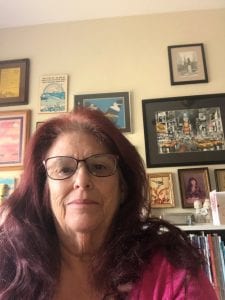Are You Feeling Like Normalcy and Control Are No Longer Within Reach? You’re Likely Experiencing Disenfranchised Grief
By Trina O’Quinn for the NABBW

Trina O’Quinn
As the pandemic continues, I am becoming more aware of what it means to experience disenfranchised grief: The illusion of Normalcy and Control is slowly being taken away from me. (I suspect that this has happened to everyone.)
In trying to write this month’s blog I realized that I was experiencing too many instances of disenfranchised grief. If I tried to cover them all this blog it would become a novel. So, I decided to write about a few of the most unrecognized or unspoken losses in my life.
The first is the loss of the ability to plan, to have something new and different to look for in the future. From the simplest activity of having a cup of coffee with a friend, to the most elaborate, such as a major trip or vacation. Presently, there are not many things in which to tell one day from another, or to get excited about. Never in my wildest imagination had I thought that the highlight of my week would be a trip to the grocery store or to a doctor’s office.
What I, and most likely others, have lost is spontaneity and adventure. One day is rolling into the next, and each day it is becoming more difficult to be excited about anything. Not only have we lost the ability to experience spontaneity, we are losing our ability to socialize, find human interaction or just have fun. Because these losses are not recognized, it is not socially acceptable to be sad while moving though them.
Another unrecognized loss is the loss of expectation of a dream or goal. When I was working and setting goals for projects, I would ask my self these two questions: 1. Where did I want to be in a year, and 2. Where did I want to be in 5 years. From there, I set objectives in order to accomplish my goals. Being dyslexic, I had to plan from where I wanted to be to where I was, then decide on the objectives. Presently I cannot do this, which is another unrecognized loss.
 Coming from a strong family-valued system and marrying a man from a family with the same values, our family get-togethers are an extremely important part of our lives. Now that we are living in different houses and different states, that may not be possible for a long time. My mother is in Assisted Living and they are now quarantined for an unspecific amount of time. I can’t plan a daily visit with her and I have no idea when I will be able to make that particular plan. This is a huge loss since I have no siblings, unrecognized by many others, as I am reminded every time I call or try to see her. We are only 3 miles apart, but it might as well be thousands. My adult children and grandchildren live 1,000 miles away. So, the dream of seeing them soon and/or having a 75th Birthday Celebration with them have been lost this year. For me, the dream of big family gatherings has been lost for now.
Coming from a strong family-valued system and marrying a man from a family with the same values, our family get-togethers are an extremely important part of our lives. Now that we are living in different houses and different states, that may not be possible for a long time. My mother is in Assisted Living and they are now quarantined for an unspecific amount of time. I can’t plan a daily visit with her and I have no idea when I will be able to make that particular plan. This is a huge loss since I have no siblings, unrecognized by many others, as I am reminded every time I call or try to see her. We are only 3 miles apart, but it might as well be thousands. My adult children and grandchildren live 1,000 miles away. So, the dream of seeing them soon and/or having a 75th Birthday Celebration with them have been lost this year. For me, the dream of big family gatherings has been lost for now.
The next unrecognized loss I am going to discuss is the additional loss from experiencing a fall. Falling happens often to the Baby Boomer Generation. Once it starts, we become fearful of doing anything alone. We lose confidence and some of our independence. Now, that has become magnified with Covid-19. I am fortunate that my spouse (82) is still living. For my fellow Baby Boomer Women who are single and alone, falls have become even more of a loss. As with my mother, they can no longer live alone and have lost a portion of their independence. They become quarantined and further isolated during this era of pandemic. This is a major loss and the mental health problem it creates is definitely unrecognized.
As I write and reflect on the subject of this blog, I have concluded that the biggest unrecognized grief of all is the loss of control. I, like many others, have lost control over where I can safely go and with whom I can safely visit. My community is divided and represents the country where I live. What I am learning is, I only had an illusion of control. In that discovery, I have lost the fantasy that I am able to make plans with any control or certainty. I am accepting that I have little control, if any, which is a major disenfranchised loss.
The resolution of this loss of control is to change the way I behave in these uncertain times. My personal stress and the action I take when I feel it, is the only thing I can control presently. As I do not have answers or fixes, I have concluded that my best option is to recognize the losses I am experiencing and let myself grieve over them. That is what I intend to do. Here are a few tips on trying to move through this grief:
- Recognize it
- Don’t rush it
- Don’t judge yourself
- Don’t try to be your old self
- Don’t minimize it
- Don’t try to control it
- Pause to Reflect, Remember, Rest, Recharge, Resolve and be Curious
- Use Rituals for structure to help yourself
- Connect or Disconnect with others
- Connect with yourself and do what you need
- Remember it is OK not to be OK
I end with a quote from a book on grief that I am currently reading: “There must be those among us whom can sit down and weep and still be counted as warriors.” – Adrienne Rich. Ponder that a bit, if you like. It’ll be my topic for next month’s article.
Trina O’Quinn is an actively licensed (California License # LMFT27407) Marriage and Family Therapist. Entering the profession as an older adult, Trina was in private practice for 30 years. During her career she was a lecturer at California University Dominguez Hills in the Marital and Family Therapy Program, where she supervised many students and mentored many associates.
Now retired, Trina keeps busy enjoying needle arts, reading, journaling and writing, as well as singing with a women’s chorus, peer networking, volunteering at a senior living center and reconnecting with old friends.


